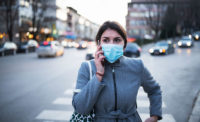Here’s what OSHA is telling employers about the new coronavirus

Most American workers are not at significant risk of contracting the new coronavirus (2019-nCoV) – but there are certain categories of employees who may be in danger of exposure, according to OSHA, which has published a webpage about the rapidly-evolving outbreak.
Thousands of cases
2019-NCoV was first detected in Wuhan City, Hubei Province, China. Chinese health officials have reported thousands of infections in that country, with the virus reportedly spreading from person-to-person - including from infected people to healthcare workers. Infections of 2019-nCoV have also been identified in the United States, Thailand, Japan, and South Korea, and are mostly associated with travel from Wuhan.
The CDC says that while imported cases of 2019-nCoV infection have been detected in the U.S., there’s been no person-to-person spread of the virus.
Travel, healthcare and border protection workers at risk
Without sustained human-to-human transmission, most American workers are not at significant risk of infection. OSHA, however, cautions that workers involved in airline operations (including cabin crewmembers), healthcare (including clinical laboratory personnel), and border protection may have exposure to travelers infected with the virus in China or other affected areas. Business travelers from the United States who visit areas abroad where the virus is spreading may also be at some risk of exposure.
According to OSHA: “There is much more to learn about the transmissibility, severity, and other features associated with 2019-nCoV as the outbreak investigation continues. Based on how other similar viruses spread, infected people may be able to spread the 2019-nCoV through their respiratory secretions, especially when they cough or sneeze. Previous outbreaks of coronavirus have been associated with spread from ill people to others through close contact, such as caring for or living with an infected person.”
Employers and workers are advised to consult interim CDC guidance specific to 2019-nCoV, along with existing resources for other coronaviruses, such as Middle East Respiratory Syndrome (MERS), for precautions appropriate for this similar virus.
Learn more:
Looking for a reprint of this article?
From high-res PDFs to custom plaques, order your copy today!





